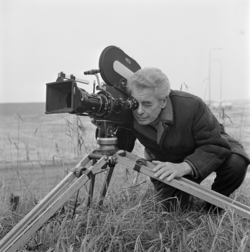Production
Background
Following the invasion of the Soviet Union by Nazi Germany in June 1941, documentary filmmaker Joris Ivens offered his services to the Dutch government-in-exile. [2] He was then appointed film commissioner of the Dutch East Indies on 28 September 1944. As film commissioner, he agreed to make films shot in the combat zone and, after the Japanese defeat, he would make educational films for the liberated colony. He was told by Charles van der Plas, the emissary of governor-general Hubertus van Mook, that the Dutch would promote "a high degree of self-determination for Indonesians in domestic affairs" in the colony after the end of World War II. [3]

After arriving in Australia in March 1945, however, Ivens discovered that many members of the Dutch East Indies government-in-exile had differing plans for the colony's future, with many of them seeing van der Plas as a destructive fool. [4] Despite the proclamation of Indonesian independence by Sukarno and Mohammad Hatta, the Dutch still sought to return to their former colony. This led to a mutiny among Indonesian seamen, followed by the refusal of Australian dockworkers' to load Dutch ships. Later, trade unionists, together with Indian and Chinese seamen, would refuse to man them as well. [5] Dutch vessels stopped from leaving Australian ports as a result of the boycott campaign are known as the Black Armada. [6]
Increasingly disenchanted with the behavior of the Dutch government, Ivens was moved by the plight of the Indonesians and the international solidarity shown by the workers. He then resigned from his position as film commissioner on 21 November 1945. [1] [7] In his resignation letter, Ivens noted that the peoples of Indonesia had the right to national independence based on the ideals of the Atlantic Charter. [8] Dutch colonial officials in Australia were furious at Ivens, with Alfred Schuurman calling him a "traitor to queen and country." [9]
Filming
Filming of Indonesia Calling began in secret five weeks before Ivens' resignation. [10] The first shots for the film were made by Ivens and cameraman John Heyer on 13 October 1945 in Sydney. However, it was only weeks later that Ivens decided to make a film about the boycott campaign. He and Marion Michelle worked together on a scenario on 24–27 October, and a production schedule was written the next day. On 30 October, the first day of shooting began. [11] The filming process was hampered by problems, including lack of film stock, equipment, and financing. [12] For instance, funding for Indonesia Calling largely came donations by Chinese waterside workers and their community in Sydney. [1] A borrowed, defective, hand-wound Kinamo portable camera was used for filming. Eastman Kodak refused to sell stock for filming, however, claiming post-war restrictions. Thus, material scrounged from wartime supplies had to be used, as well as leftovers supplied by Harry Watt, who was then shooting The Overlanders. [12] It was later revealed that "certain parties" had asked Kodak to not sell film stock to Ivens, and they agreed to do so. [1]